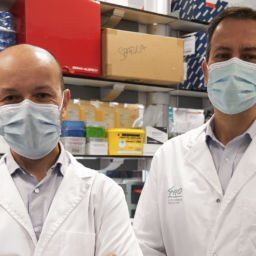
- Published in Molecular Cancer Therapeutics*, a journal of the American Association for Cancer Research (AACR), results of a study co-led by Joan Seoane at VHIO evidence the striking anti-tumor activity of a novel EGFRvIII-T cell bispecific antibody in preclinical, patient-derived models of glioblastoma, the most common and aggressive type of brain cancer.
- Results show that this bispecific antibody induces T cell recruitment and infiltration in vitro and in vivo, resulting in tumor regression and anti-tumor response in intracranial tumors.
- These preclinical data have provided the rationale for a first-in-human clinical trial to assess this bispecific compound as monotherapy in newly diagnosed or recurrent EGFRvIII-positive glioblastoma. This study is currently recruiting patients across several cancer centers, including VHIO.
- Designed and developed by the study investigators, this EGFRvIII-targeted immune-based therapy could potentially change the treatment landscape of glioblastoma, a notoriously difficult-to-treat and lethal tumor type.
Glioblastoma multiforme (GBM) is one of the most aggressive, fast-growing tumor types, and the most common cancer of the brain with a median overall survival of approximately 15 months. Despite recent advances in treatment modalities, GBM remains largely incurable.
“Considering the dismal prognosis of glioblastoma, improving outcomes for these patients represents a critical, unmet clinical need. While immune-based therapies have stepped up in more effectively treating some tumor types including melanoma and lung cancer, this promise has not yet been extended to non-inflamed, ‘cold’ tumors such as glioblastoma,” says Joan Seoane, co-Director of VHIO’s Preclinical and Translational Research Program, and corresponding author of this present study*, alongside Pablo Umaña, Roche Innovation Center Zurich (RICZ), Roche Pharma Research and Early Development (pRED), Switzerland.
Over recent years, bispecific antibodies in cancer immunotherapy have gained momentum in preclinical and clinical investigations and several have subsequently been approved for the treatment of different malignancies including acute lymphoblastic leukemia. These agents have yet to demonstrate efficacy in combating other forms of cancer including solid tumors. The main challenge in developing T cell bispecific antibodies is the lack of tumor-specific antigens that can exclusively target tumor cells while leaving healthy cells unharmed. In the case of GBM, inherent low levels of CD8 T cell infiltration represents an additional, hindering factor.
Results of this current research, now published in Molecular Cancer Therapeutics*, could ultimately overcome these two major obstacles, and therefore extend the potential of immune-based therapies to this patient population.
EGFR variant III as a target for immunotherapy
The tumor-specific expression of epidermal growth factor receptor variant III (EGFRvIII), the most common EGFR mutation that occurs in up to 25-30% of high-grade gliomas especially GBM, represents a neoantigen exclusively expressed in tumor cells and could open up a new avenue for the development of EGFRvIII-targeting T cell bispecific antibodies.
“Since EGFRvIII is only expressed on the surface of tumor cells and not in healthy tissue, this novel target could play an important part in mounting an immune response. The possibility of redirecting T cells to hone in on and destroy cancer cells could translate in improved outcomes for glioblastoma patients,” adds Joan Seoane, an ICREA Research Professor and Principal Investigator of VHIO’s Gene Expression and Cancer Group.
A two-pronged approach
In this present study, the investigators designed and developed the novel EGFRvIII-T cell bispecific antibody (EGFRvIII-TCB). Specifically, EGFRvIII-TCB recruits CD3-positive T cells, that are implicated in activating both the cytotoxic T cell and T helper cells, to the vicinity of EGFRvIII expressing tumor cells to induce cytotoxicity.
This antibody has three arms, two of which target this mutation and the other fuses with T cells. This 2:1 strategy potentiates it to boost T cell infiltration and trigger activation in EGFRvIII-expressing glioblastomas.

“When the mutation is not present, the antibody does not work. Only those patients with tumors expressing EGFRvIII would benefit from this immune-based treatment. Our novel compound could extend the promise of precision medicine to glioblastoma and provide patients with a safer treatment option by avoiding damage to healthy cells,” says Rafaella Iurlaro, co-first author of this manuscript and a Post-Doctoral Fellow of Joan Seoane’s group.
Putting EGFRvIII-TCB to the clinical test
The preclinical validation of this bispecific antibody, spearhead by Joan Seoane, has provided the rationale for a first-in-human clinical trial to assess this bispecific compound as monotherapy in newly diagnosed or recurrent EGFRvIII-positive glioblastoma.
Aimed at verifying the safety of this agent in patients, determining the optimal dosage, and obtaining data that support its efficacy in the clinic, this trial is currently recruiting patients across five cancer centers, including VHIO, and is led by María Vieito, a CORE Phase I Investigator at VHIO’s Research Unit for Molecular Therapy of Cancer (UITM)-CaixaResearch, and a Medical Oncologist at the Vall d’Hebron University Hospital’s (HUVH) Medical Oncology Department led by VHIO’s Director Josep Tabernero (Vall d’Hebron Barcelona Hospital Campus).
“The possibility of driving T cells into a cold tumor such as glioblastoma represents a turning point in the more effective treatment of this devastating disease. Based on our preclinical data, we have every reason to be optimistic about the early clinical drug development phase of our investigations,” concludes Seoane.
This present research was mainly supported by funding received from the Loterías y Apuestas del Estado (Spain’s National Lottery Agency) through the Fundación Asociación Española contra el Cáncer – AECC (Spanish Association against Cancer), as well as the Fundación FERO (FERO Foundation), and the Fundación BBVA (BBVA Foundation) Comprehensive Program of Cancer Immunotherapy and Immunology (CAIMI) – one of VHIO’s institutional programs.
Reference:
*Raffaella Iurlaro, Inja Waldhauer, Ester Planas-Rigol, Ester Bonfill-Teixidor, Alexandra Arias, Valeria G. Nicolini, Anne Freimoser-Grundschober, Isabel Cuartas, Alba Martinez-Moreno, Francisco Martinez-Ricarte, Esteban Cordero, Marta Cicuendez, Simona Casalino, Xavier Guardia, Linda Fahrni, Thomas Poeschinger, Virginie Steinhart, Marine Richard, Stefanie Briner, Joerg PJ. Mueller, Franz Osl, Johannes Sam, Sara Colombetti, Marina Bacac, Christian Klein, Estela Pineda, Luis Reyes-Figueroa, Alberto Di Somma, Josep Gonzalez, Paolo G. Nuciforo, Joan Carles, María Vieito, Josep Tabernero, Pablo Umana, Joan Seoane; A novel EGFRvIII-T cell bispecific antibody for the treatment of glioblastoma. Mol Cancer Ther 2022; https://doi.org/10.1158/1535-7163.MCT-22-0201.






















